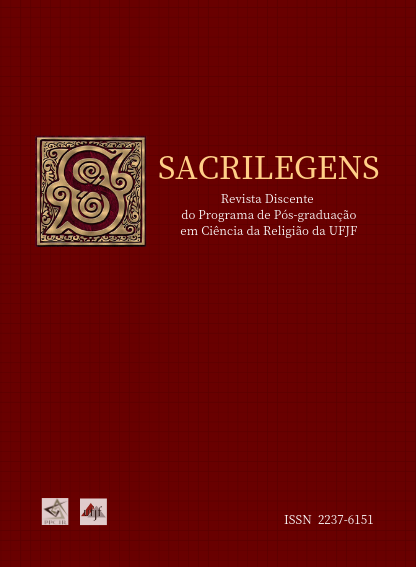Religião sem Deus: contribuição do jovem Heidegger para a filosofia da religião
Palavras-chave:
Heidegger, fenomenologia, faticidade, religiãoResumo
O intuito do presente trabalho é apresentar as considerações heideggerianas acerca do que postula ser a tarefa da filosofia e, por conseguinte, da filosofia da religião. A partir de 1919 estendendo-se ao longo da década de 1920, o filósofo alemão apresentou, em alguns trabalhos, a filosofia como metodologicamente ateia; e, em determinado momento, categoricamente afirma que uma filosofia cristã seria inconcebível, uma vez que seu “objeto” de estudo não é o mesmo do cristianismo ou da teologia. A filosofia, portanto, tem como telos, no pensamento do jovem fenomenólogo, a experiência originária da vida fática. Com essa concepção, até mesmo a religião visitada pela filosofia tem como fim essa experiência e não, por exemplo, a discussão em torno da questão de um Deus a qual essa vivência religiosa poderia remeter. Assim, a faticidade e a fenomenologia são abordadas para compreender em que medida é possível pensar a religião filosoficamente.
Downloads
Referências
CAPUTO, John. On Religion. New York, NY: Thinking in Action, 2001.
HEIDEGGER, Martin. Fenomenologia e teologia. In: Marcas do caminho. Trad. Enio Paulo Giachini e Ernildo Stein; rev. Marco Antônio Casanova. Petrópolis, RJ: Vozes, 2008.
______. Interpretações fenomenológicas sobre Aristóteles; introdução à pesquisa fenomenológica. Trad. Enio Paulo Giachini. Petrópolis, RJ: Vozes, 2011.
______. Introdução à fenomenologia da religião. In: Fenomenologia da Vida Religiosa. Trad. Enio Paulo Giachini, Jairo Ferrandin, Renato Kirchner. Petrópolis, RJ:
Vozes; Bragança Paulista, SP: Editora Universitária São Francisco, 2010a.
______. Ontologia: (hermenêutica da faticidade). Trad. Renato Kirchner. Petrópolis, RJ: Vozes, 2012a.
______. Os conceitos fundamentais de metafísica: mundo, finitude, solidão. Trad. Marco Antônio Casanova. Rio de Janeiro: Forense Universitária, 2006.
______. Os fundamentos filosóficos da mística medieval. In: Fenomenologia da Vida Religiosa. Trad. Enio Paulo Giachini, Jairo Ferrandin, Renato Kirchner. Petrópolis, RJ: Vozes; Bragança Paulista, SP: Editora Universitária São Francisco, 2010b.
______. Os problemas fundamentais da fenomenologia. Trad. Marco Antônio Casanova. Petrópolis, RJ: Vozes, 2012b.
______. Platão: o sofista. Trad. Marco Antônio Casanova. Rio de Janeiro: Forense Universitária, 2012c.
OTTO, Rudolf. O sagrado: os aspectos irracionais na noção do divino e sua relação com o racional. 2ª edição. Trad. Walter O. Schlupp. São Leopoldo: Sinodal/EST;
Petrópolis: Vozes, 2011.
VOLPI, Franco. Heidegger y Aristóteles. 1ª edição. Buenos Aires: Fondo de Cultura Económica, 2012.
Downloads
Publicado
Como Citar
Edição
Seção
Licença
 A Revista Sacrilegens é um periódico de acesso aberto, licenciada sob a licença Creative Commons Attribution 4.0 International
A Revista Sacrilegens é um periódico de acesso aberto, licenciada sob a licença Creative Commons Attribution 4.0 International










